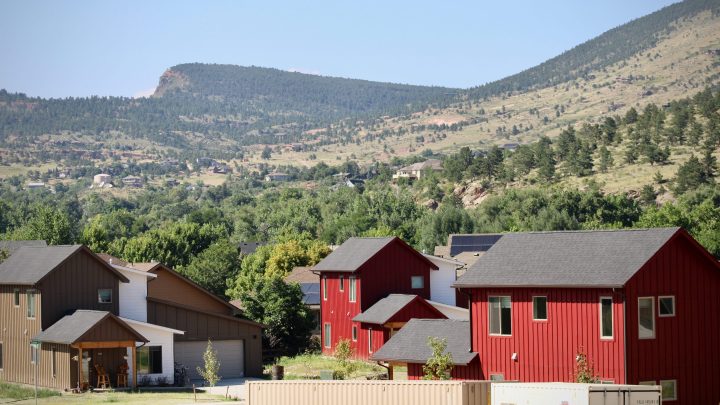
After disasters, mobile home owners often struggle to recover
After disasters, mobile home owners often struggle to recover

Mobile homes are particularly vulnerable to natural disasters — they’re structurally weaker than traditional homes. One in seven mobile homes nationwide is built in a flood-prone area, compared to 1 in 10 traditional homes. And mobile home residents tend to be low-income. Once a disaster does strike, it’s hard for them to get the money they need to get back on their feet.
In Lyons, Colorado, devastating floods tore through the community ten years ago and destroyed about 50 mobile homes. A decade later, many mobile homeowners are still struggling to recover.
When the rain started in Colorado, it was coming down hard. At first, Bonnie Newman, who lived there, wasn’t worried. Then, in the middle of the night, she awoke to see that something had changed.
“Suddenly there was water,” Newman said. “Lots of water.”
Newman watched the river get higher and closer to her mobile home in Lyons, a town of a couple thousand people nestled in the foothills, about a half hour from Boulder.

“It was a current of water,” Newman said, “and it was right through my yard. They said, ‘Get out, head for high ground.’ And I didn’t ask questions.”
That was the last night Newman spent at home. Her double wide trailer was flooded chest high, filled with mud and debris. It was totaled. That was just the start of a long journey to get back on her feet.
“I don’t think any of us planned to leave,” she said. “We just didn’t have a choice.”
Two mobile home parks in Lyons were destroyed, and almost everyone who lived there left town. Many of them didn’t have flood insurance.
The Federal Emergency Management Agency came through with some aid, but the agency points out that its payments are not designed to fund a total rebuild.
Newman got $15,000. Her old next-door neighbor, Amanda Anderson, got the maximum payout from FEMA, $31,000. Anderson said that wasn’t enough, and another neighbor got even less, without any explanation.
“She was right next to me,” Anderson said. “None of it made sense.”
What happened in Lyons sounds familiar to Kristin Smith, who researches flood recovery at the think tank Headwaters Economics.
“Research shows that mobile home residents do have a harder time than most other residents in getting the recovery money,” she said.
After a disaster, mobile home residents can be faced with expensive repairs on homes that oftentimes aren’t worth much to begin with. And when they get wiped out, Smith said you’re not just losing mobile homes, you’re losing affordable homes.
“Mobile homes are the most common affordable housing strategy in the United States,” she said, “And I think a lot of people don’t know that.”
In Lyons, there’s been an effort to add to the affordable housing stock. And still, ten years later, they’re trying to rehouse people who were displaced by the flooding.
New affordable housing in Lyons gives priority to people who lost their homes in 2013, but few applicants are coming from mobile homes. Victoria Simonsen, the town administrator, said that’s in large part because they’ve already moved away.
“People stayed with family and friends for sometimes up to a year or two,” she said. “But at some point, you have to reestablish.”
Another thing that makes disaster recovery especially hard on mobile home residents is the way ownership works.
“They fall somewhere halfway between ownership and rental,” said Andrew Rumbach, a senior fellow at the Urban Institute. “The people who live in these parks often own their home, but they don’t own the land underneath it. And so our policies about disaster recovery actually struggle to acknowledge and capture that.”
In the decade since the floods, some things have changed for the better. Rumbach said a number of local governments have made it easier for mobile home residents to access money and housing. And across the country, those residents are forming co-ops or banding together to buy the parks they live in.

Amanda Anderson, who lost her mobile home in Lyons, thinks that would have given her neighborhood a lot more options to rebuild or get paid after the floods.
“That would be my biggest take away from going through a natural disaster,” she said. “Buy out your land owner before it’s too late.”
Anderson has gone back, and said it’s hard to see what the property owner did with the land where she used to live. Now, it’s a “tiny house resort,” where visitors can rent a room for about $200 or $300 a night.
There’s a lot happening in the world. Through it all, Marketplace is here for you.
You rely on Marketplace to break down the world’s events and tell you how it affects you in a fact-based, approachable way. We rely on your financial support to keep making that possible.
Your donation today powers the independent journalism that you rely on. For just $5/month, you can help sustain Marketplace so we can keep reporting on the things that matter to you.











